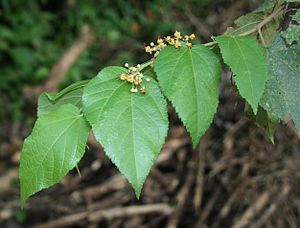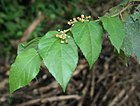Note: This is a project under development. The articles on this wiki are just being initiated and broadly incomplete. You can Help creating new pages.
Difference between revisions of "Guazuma ulmifolia"
| (One intermediate revision by the same user not shown) | |||
| Line 2: | Line 2: | ||
'''Guazuma ulmifolia''' is a tree with a spreading, rounded crown; it can grow 10 - 30 metres tall. The straight, cylindrical bole is 30 - 40cm, occasionally to 60cm in diameter. The plant is evergreen, except in areas with a long, dry season. | '''Guazuma ulmifolia''' is a tree with a spreading, rounded crown; it can grow 10 - 30 metres tall. The straight, cylindrical bole is 30 - 40cm, occasionally to 60cm in diameter. The plant is evergreen, except in areas with a long, dry season. | ||
==Uses== | ==Uses== | ||
| − | {{Uses|Baldness}}, {{Uses|Blood pressure}}, {{Uses|Gonorrhea}} | + | {{Uses|Baldness}}, {{Uses|Blood pressure}}, {{Uses|Gonorrhea}}, {{Uses|Wounds}}, {{Uses|Alopecia}}, {{Uses|Fever}}, {{Uses|Desentery}}<ref name="Uses"/> |
==Parts Used== | ==Parts Used== | ||
| − | {{Parts Used| | + | {{Parts Used|Seed}}, {{Parts Used|Fruit}}, {{Parts Used|Stem bark}}, {{Parts Used|Leaf}}<ref name="Karnataka Medicinal Plants"/>. |
==Chemical Composition== | ==Chemical Composition== | ||
| Line 11: | Line 11: | ||
==Common names== | ==Common names== | ||
| − | {{Common names|sa= | + | {{Common names|sa=Pundraksha|en=West Indian Elm, Honey tree|gu=Bhadraksha|hi=Rudrakshi|kn=Badrakshi, Jenumara|ks=|ml=Rudraksham|mr=Rudrakshi|pa=|ta=Thenmaram, Natturudraksha|te=Bhadraksha, Rudraksha}}<ref name="Karnataka Medicinal Plants"/> |
==Properties== | ==Properties== | ||
| Line 36: | Line 36: | ||
===Flower=== | ===Flower=== | ||
| − | {{Flower||||}} | + | {{Flower||||Flowering from April to May}} |
===Fruit=== | ===Fruit=== | ||
| − | {{Fruit||||||}} | + | {{Fruit||||||Fruiting from April to May}} |
===Other features=== | ===Other features=== | ||
| Line 75: | Line 75: | ||
<ref name="How to plant/cultivate">[http://tropical.theferns.info/viewtropical.php?id=Guazuma+ulmifolia Cultivation]</ref> | <ref name="How to plant/cultivate">[http://tropical.theferns.info/viewtropical.php?id=Guazuma+ulmifolia Cultivation]</ref> | ||
<ref name="Uses">Indian Medicinal Plants by C.P.Khare</ref> | <ref name="Uses">Indian Medicinal Plants by C.P.Khare</ref> | ||
| + | |||
| + | <ref name="Karnataka Medicinal Plants">”Karnataka Medicinal Plants Volume-3” by Dr.M. R. Gurudeva, Page No.964, Published by Divyachandra Prakashana, #6/7, Kaalika Soudha, Balepete cross, Bengaluru</ref> | ||
</references> | </references> | ||
Latest revision as of 13:15, 25 January 2022
Guazuma ulmifolia is a tree with a spreading, rounded crown; it can grow 10 - 30 metres tall. The straight, cylindrical bole is 30 - 40cm, occasionally to 60cm in diameter. The plant is evergreen, except in areas with a long, dry season.
Contents
- 1 Uses
- 2 Parts Used
- 3 Chemical Composition
- 4 Common names
- 5 Properties
- 6 Habit
- 7 Identification
- 8 List of Ayurvedic medicine in which the herb is used
- 9 Where to get the saplings
- 10 Mode of Propagation
- 11 How to plant/cultivate
- 12 Commonly seen growing in areas
- 13 Photo Gallery
- 14 References
- 15 External Links
Uses
Baldness, Blood pressure, Gonorrhea, Wounds, Alopecia, Fever, Desentery[1]
Parts Used
Seed, Fruit, Stem bark, Leaf[2].
Chemical Composition
Common names
| Language | Common name |
|---|---|
| Kannada | Badrakshi, Jenumara |
| Hindi | Rudrakshi |
| Malayalam | Rudraksham |
| Tamil | Thenmaram, Natturudraksha |
| Telugu | Bhadraksha, Rudraksha |
| Marathi | Rudrakshi |
| Gujarathi | Bhadraksha |
| Punjabi | |
| Kashmiri | |
| Sanskrit | Pundraksha |
| English | West Indian Elm, Honey tree |
Properties
Reference: Dravya - Substance, Rasa - Taste, Guna - Qualities, Veerya - Potency, Vipaka - Post-digesion effect, Karma - Pharmacological activity, Prabhava - Therepeutics.
Dravya
Rasa
Guna
Veerya
Vipaka
Karma
Prabhava
Habit
Identification
Leaf
| Kind | Shape | Feature |
|---|---|---|
Flower
| Type | Size | Color and composition | Stamen | More information |
|---|---|---|---|---|
| Flowering from April to May | {{{5}}} |
Fruit
| Type | Size | Mass | Appearance | Seeds | More information |
|---|---|---|---|---|---|
| Fruiting from April to May |
Other features
List of Ayurvedic medicine in which the herb is used
Where to get the saplings
Mode of Propagation
How to plant/cultivate
A plant of the dry to moist tropics, where it is found at elevations up to 1,200 metres.[5]
Commonly seen growing in areas
Colonizes recently disturbed areas, Stream banks, Secondary forest.
Photo Gallery
References
External Links
- Ayurvedic Herbs known to be helpful to treat Baldness
- Ayurvedic Herbs known to be helpful to treat Blood pressure
- Ayurvedic Herbs known to be helpful to treat Gonorrhea
- Ayurvedic Herbs known to be helpful to treat Wounds
- Ayurvedic Herbs known to be helpful to treat Alopecia
- Ayurvedic Herbs known to be helpful to treat Fever
- Ayurvedic Herbs known to be helpful to treat Desentery
- Herbs with Seed used in medicine
- Herbs with Fruit used in medicine
- Herbs with Stem bark used in medicine
- Herbs with Leaf used in medicine
- Herbs with common name in Kannada
- Herbs with common name in Hindi
- Herbs with common name in Malayalam
- Herbs with common name in Tamil
- Herbs with common name in Telugu
- Herbs with common name in Marathi
- Herbs with common name in Gujarathi
- Herbs with common name in Sanskrit
- Herbs with common name in English
- Habit - Deciduous tree
- Index of Plants which can be propagated by Seeds
- Herbs that are commonly seen in the region of Colonizes recently disturbed areas
- Herbs that are commonly seen in the region of Stream banks
- Herbs that are commonly seen in the region of Secondary forest
- Herbs
- Pages without herbs images






